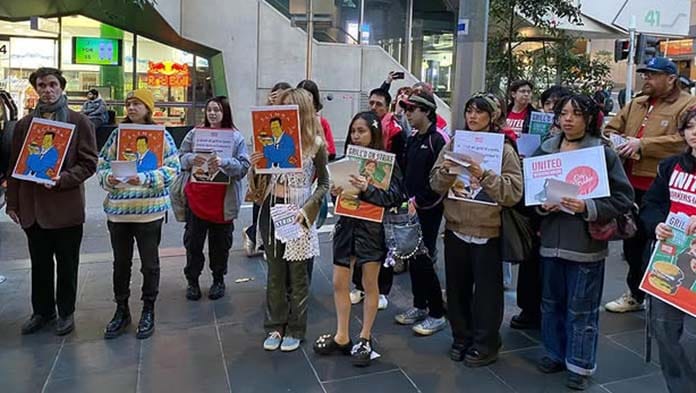Fast food workers at the popular burger chain Grill’d took strike action last Friday, rallying outside the Flinders Lane store in Melbourne CBD to demand fair wages and better conditions.
Chants of “Overworked and underpaid, don’t eat at Grill’d today!” rang out through Melbourne’s inner city from 5pm as around 30 workers rallied outside the store.
“It was just our store first [in 2024] but now we’ve got strikes happening in South Australia, NSW and Queensland,” Lara, a union delegate at the Flinders Lane store, told Solidarity.
The workers, members the United Workers Union (UWU), were on strike for the second time in a week, after the Fair Work Commission threw out an agreement the company imposed last year. It found that Grill’d had failed in its responsibility to adequately explain the terms of the agreement to workers, which freezes penalty rates instead of tying them to increases in their pay rate and increases wages by just 1 per cent per year.
The union is demanding pay rises that match inflation, guaranteed minimum hours a week, restrictions on overtime for workers in more experienced roles, and back pay.
While the 28 June action in Melbourne focused on strikers going around different stores in the city to call on their colleagues to join them, Friday’s strike focused squarely on disrupting dinner rush hour to hit company profits.
It follows their historic strike in October 2024, the first time in recent memory that fast food workers took strike action in Australia. The Flinders Lane store was picked as the location for this strike as the site with the highest union density and the epicentre of the historic 2024 walk-off.
For many years, the founder and CEO of the so-called “healthy” burger outlet, Simon Crowe, has made healthy profits by mercilessly exploiting his workers. Crowe has used a traineeship system to force workers, the majority of them under 18, onto “junior rates”, paid below the minimum wage on as little as $12 an hour.
“The traineeship goes for an entire year,” one worker explained. “We don’t get penalty rates.” Yet Grill’d still imposes a weekend surcharge on prices to boost its profits.
Workers’ hourly wages do not even cover the cost of a meal at Grill’d, as signs at the rally noted, while Crowe has a net worth of $450 million.
In 2022 the burger mogul, who owns 173 Grill’d stores across the country, spent $22.6 million to buy a mansion in Toorak, spending another $5.9 million the next year to secure a neighbouring property.
Rebuilding union power
The strikes are the product of committed rank-and-file organising that shows how to build union strength among young workers, in an industry with little history of union organisation.
Lara, a delegate who helped organise the 2024 strike, explained how discussions among workers about being ripped off by the company had pushed them to organise:
“If you’re coming in day in and day out doing hard labour … and not being compensated fairly and your friends at other hospo venues are getting paid more than you, you start to wonder maybe I’m not getting the best deal”.
Union delegates drew inspiration from the strikes organised by young workers at Starbucks in the US.
Another worker, Alannah, said that Grill’d, “don’t care about the people, they only care about the profit. We need to demand better pay, better treatment because they won’t do it for us”.
“We’ll be able to change things if we have a large amount of people fighting”.
The Flinders Lane store, staffed by a skeleton crew of scab managers, was forced to close at 8:45pm—well over an hour earlier than scheduled.
Grill’d workers are setting an inspiring example of how young workers can stand up, unionise, and strike against low wages and bullying bosses.
By Tom Fiebig






